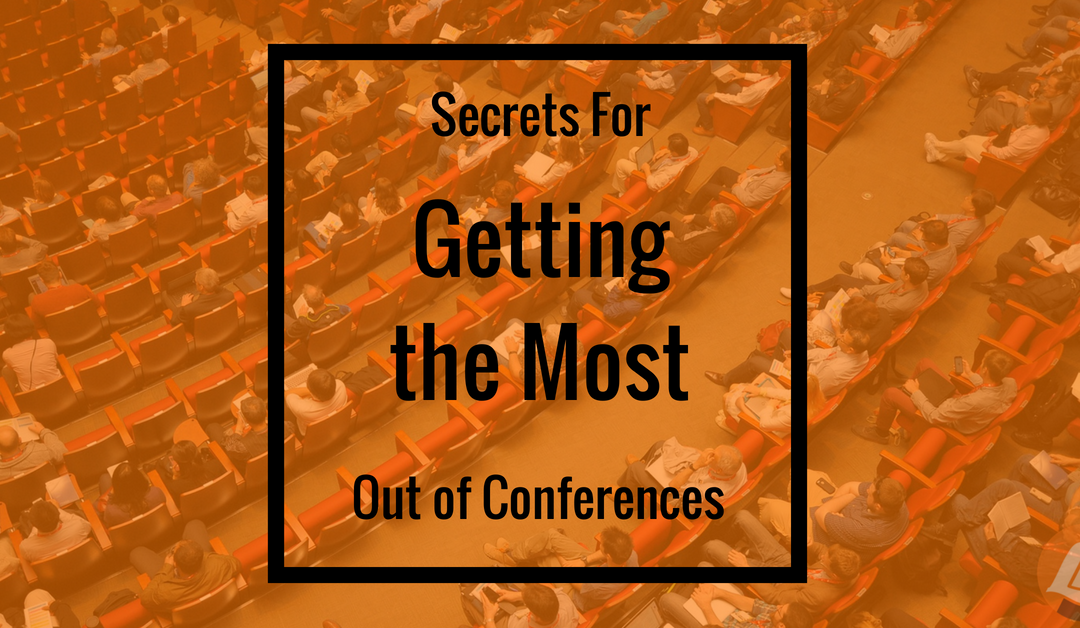Select the right events, set goals
What’s the reason you’re attending the conference? For most attendees, it’s usually either networking or learning. It’s helpful to identify this ahead of time and set corresponding goals. Because these events are often back-to-back action, you need to plan accordingly. Both categories benefit from arriving at sessions early.
For the networker, the tight schedule means you may even need to sit out of a talk or two to get some networking done. Networkers should arrive promptly at the next talk or even stay in the room they’re in regardless of what session is next – thus letting new bodies come in and sit next to you.
If your event is only in one conference room (not the norm), get up and move around to sit by new people. Set a realistic and numeric goal about how many people you’d like to connect with.
Set a plan on how you’ll connect with them, and what you’ll do to follow up after. Some of the most successful we’ve seen spend time on breaks seeking their new contacts out on social media like LinkedIn to request a connection while it’s still fresh.
For the learning-focused conference attendee, it’s important to know which talks you want to attend ahead of time, so you know what room you’re heading to. It’s helpful to jot down questions you have for the speakers as the talks progress. You may have an opportunity to ask.
Arrive early to the conferences
Both the networker and the learner will want to arrive the night before. Some conference events will give you (or sell you) access to a pre-conference mixer. You may even get a chance to mingle with speakers. Networkers and learners can both network un-encumbered by competing with lectures for networking time and avoid trying to cram it between sessions.
Both groups also benefit from making it a reasonably early night to get a good night’s sleep before the event. Arriving at least on-time to the even also usually gives you access to some of the best content.
Network effectively, and politely
First and foremost, avoid pitching people and don’t just cram a business card in every hand you see. Be genuinely interested in others. Remember, you have two ears and one mouth – use them proportionately. If you’re looking to make an impression on fellow attendees and speakers, you are more memorable the more interested you are in them.
Plan your approach to talk with speakers. If you’re not familiar with the speakers, look them up and learn a little. Be conversational and think of intelligent questions you can ask (allowing them to expand on). It’s far more engaging to respond to “What’s your take on this latest…” than “Oh, I love your stuff, I’m such a fan!”
Mix with new people, don’t clump with your group. Choose separate sessions or areas of the room within the same session. Mealtimes can be an opportunity to converse, but realize some people have apprehension to eating (and talking with their mouth full) in front of others. Also, consider that even if this isn’t a time for you to decompress others may have carved this out for themselves.
Take notes, ask thoughtful questions
Be sure to take notes even if your conference access level entitles you to the slide decks or audio/video transcripts – writing re-enforces what you’re hearing, and signals to the speaker you’re listening. It’s also easier to pull out memorable highlights from your notes to share with your co-workers or on social media.
Ask questions, but don’t hog the speaker’s attention with repeat questions. This applies to the official Q&A, as well as if they hang around after their talk. Try to make your questions applicable to other attendees instead of laser-focused on your specifics. If you don’t get a microphone, be sure to ask your question loudly.
Review
By taking the time to review, you reinforce what you took in. Make use of your notes and active listening. Share posts and thoughts on social media. This can be done throughout the day, back at the hotel room, and after you’ve returned home with a more “digested” understanding.
Consider briefing co-workers formally at a meeting or even informally if you think they might benefit in discussing what you learned. Teaching someone else the information exercises the highest levels of information retention and comprehension.
Take time to review your goals too. Did you meet them? Choose them effectively? Is there something you would do differently next time? Perhaps chatting with that vendor booth led you to a valuable industry connection?

